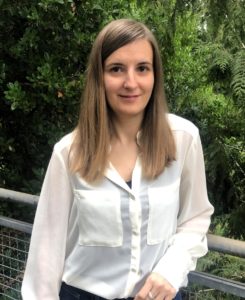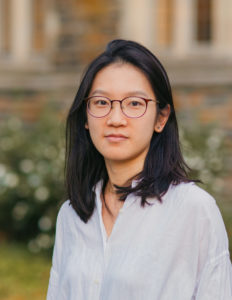RSC Applied Polymers has published its first articles. To celebrate this we wish to introduce some of our #RSCAppliedfirst50 authors and their recently published articles.
In this post we feature an introduction to 3D printed modular piezoionic sensors using dynamic covalent bonds by Alshakim Nelson et al.
An Introduction to 3D printed modular piezoionic sensors using dynamic covalent bonds by Alshakim Nelson et al.
In our newest publication in RSC Applied Polymers, we demonstrate 3D printed piezoionic sensors that can be configured based on the needs of the individual user. Elastomeric ionogels comprising reversible Diels-Alder connections were 3D printed using a commercial printer. 3D printing allows the user to determine the geometrical shape of the printed object. However, the 3D printed objects described in this paper are also covalent adaptive networks, which enables self-healing and interfacial bonding between objects. As a result, these piezoionic sensors are durable and can be fused into any desirable configuration. Our work showcases the important features of decentralized production using additive manufacturing. Primarily, the individual user has greater control over the design and deployment of active devices in the locations where they are required.

Julian Smith Jones
Julian Smith-Jones received his PhD from the University of Washington where he conducted research on the synthesis and characterization of ionic liquid gels as a platform for creating conductive elastomeric sensors in the Nelson lab. He is currently working as a polymer chemist at Meta.

Nathan Ballinger
Nathan Ballinger is a chemistry graduate student at Caltech who did undergraduate research at the University of Washington in Seattle. His undergraduate research in the Nelson Lab focused on stimuli responsive ion-gels and hydro-gels for additive manufacturing.

Naroa Sadaba
Naroa Sadaba is a postdoctoral researcher in the Nelson lab at the University of Washington in Seattle. Her research focuses on biomaterials for additive manufacturing.

Xabier Lopez de Pariza
Xabier Lopez de Pariza is a postdoctoral researcher at Polymat-University of the Basque Country in San Sebastian (Spain). His research interests include sustainable polymers and vat photopolymerization.

Yunxin Yao
Yunxin Yao is a fourth-year graduate student in the Department of Chemistry at Duke University under the guidance of Prof. Stephen L. Craig. Her research primarily focuses on investigating the correlation between microscopic chemical reactions and the macroscopic mechanical properties of polymer networks.

Steven Craig
Stephen Craig is a Professor of Chemistry at Duke University and the Director of the NSF Center for Molecularly Optimized Networks (MONET). His research interests are centered around chemical reactivity that is embedded within polymeric materials.

Haritz Sardon
Haritz Sardon is a Professor of Chemistry at the University of Basque Country-POLYMAT in San Sebastian. His research combines sustainability aspects with additive manufacturing.

Alshakim Nelson
Alshakim Nelson is a Professor of Chemistry at the University of Washington in Seattle. His research includes stimuli-responsive and polymeric materials for additive manufacturing.
3D printed modular piezoionic sensors using dynamic covalent bonds
RSC Appl. Polym., 2024, Advance Article. DOI:10.1039/D3LP00289F
 |
RSC Applied Polymers is a leading international journal for the application of polymers, including experimental and computational studies on both natural and synthetic systems. In this journal, you can discover cross-disciplinary scientific research that leverages polymeric materials in a range of applications. This includes high impact advances made possible with polymers across materials, biology, energy applications and beyond. |




